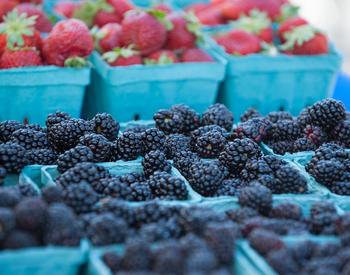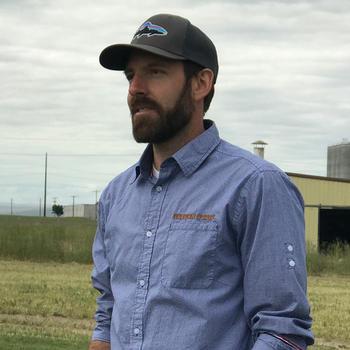Lukas brings new perspective to Extension's Willamette Valley berry program
AURORA, Ore. – From a stint at a nursery to working in molecular biology to researching crops in Hermiston, Scott Lukas forged a circuitous route to his new position as Oregon State University Extension Service berry specialist.
Lukas is no stranger to fruit. In his former job as associate professor and researcher at the Hermiston Agricultural Research and Extension Center, Lukas spent his days working on 200 irrigated specialty crops like blueberries, strawberries, melons and tree fruits. He also had responsibility for vegetables like onions, sweet corn, beans and just about anything that grows in north central Oregon except large crops like wheat and potatoes.
Now Lukas steps into a job focused solely on small fruits – blueberries, blackberries, red and black raspberries, cranberries and kiwi. Funded in part by an endowment, his new position at the North Willamette Research and Extension Center in Aurora takes on the research, teaching and outreach led by recently retired Bernadine Strik.
“We are looking forward to Dr. Lukas joining our team of excellent faculty at NWREC,” said Surendra Dara, NWREC director. “The berry research program at NWREC serves the critical needs of the Oregon berry industry in the Willamette Valley and elsewhere. I have full confidence that this program will continue to grow under Dr. Lukas’ leadership and exceeds our stakeholders’ expectations.”
During Strik’s 34-year career, blueberries became an important crop in Oregon. Acreage jumped from 1,200 to 15,000 acres. The state now grows the second-most blueberries in the country, producing 154 million pounds. With a production value of $120 million, blueberries were the 11th most valuable crop in the state in 2020. One more blueberry fact: Strik’s landmark 14-year project on organic blueberry production helped drive an increase in Oregon organic acreage from 2% in 2006 to 20% in 2020, catapulting the Pacific Northwest into the largest organic production region for blueberries in the world.
When Lukas served Umatilla and Morrow counties, organic blueberries eventually took up 80% of his time.
“Scott is a great hire for our berry research,” said Mike Bondi, former director of NWREC. “He comes from the Hermiston Agricultural Research and Extension Center where one of his main crops was blueberry production on the east side of the state. Scott built an excellent program there. He’s very personable, understands and relates to his growers and their needs and he’s on top of the science.”
Finding joy in the greenhouse
Lukas, who grew up in Reno, Nevada, got his bachelor’s degree in biology from the university of Nevada, Reno. He followed that up with a master’s and a Ph.D. from University of Hawaii at Manoa.
As a kid Lukas always wanted to be outdoors. If he was inside, he’d be thinking about when he could be outside again. But it was in a classroom that he was first exposed to plants.
“The horticulture class had a greenhouse,” Lukas said. “That was the first greenhouse I’d ever been in and I fell in love. I was so excited about my first harvest. It was a little thing but I still remember the feeling of producing something.”
After high school, Lukas worked at a nursery and fell in love with that, also. He chose biology as a major with dual specializations in molecular biology and ecology. He said he wanted to see the little picture as well as the big picture. An internship in a microbiology lab studying deep sea hydrothermal vents turned him onto marine biology. That didn’t work out well.
“I was working with (Oregon) Fish & Wildlife in Charleston on the coast,” Lukas said. “We went on a research expedition to quantify the sustainability of a fishery. I quickly figured out I get seasick. That revelation is what moved me in the direction I am today and I’m really happy.”
As he starts his new position, Lukas said his first priority is maintaining continuity with Strik’s program.
“Bernadine did an amazing job creating this program,” he said. “She built networks, did impactful research and put together a really, really amazing team. I want to make sure they have what they need to continue ongoing projects so we don’t lose time or move backward. I am going to wrap my head around the program and its moving parts and become familiar with the region’s production and come up with real solutions for real problems.”
In the short term, Lukas said there is a pressing need to focus on the key issue of heat tolerance in small fruits as extreme weather events cause production challenges. He wants to figure out what the obstacles are for using overhead cooling and look at automated systems that turn on irrigation automatically as determined by weather and moisture, saving water, time and money.
Berry program '2.0'
A long-term priority is labor, which is a growing bottleneck in all areas of agriculture. Lukas and his team will work to identify ways to mechanize harvests, making the process more efficient and cutting down on the need for labor. Training labor forces and management is important, too.
Lukas said he brings a fresh perspective to start the berry program “2.0.” He plans to recommend options for technological advancements whether that’s using drones to assess crops or automation. Using technology is a paradigm shift for many growers and illustrates how farming is changing over generations.
“The Department of Horticulture is excited to welcome a well-established faculty member to North Willamette Research and Extension Center where he will continue and expand his research and Extension programs serving berry growers in Oregon,” said Bill Braunworth, head of the Department of Horticulture in the College of Agricultural Sciences. “We are very thankful to the groups and individuals who have contributed to the endowment that provides important support to this position.”

 Extension Service
Extension Service